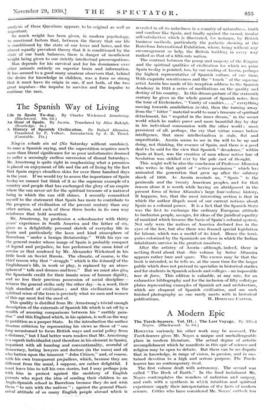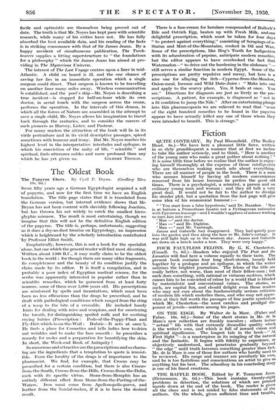A Modern Epic
The Torch-bearers. Vol. : The Last voyage. By Alfred
Noyes. (Blackwood. 7s. ed.) HOWEVER variously his other work may be assessed, The Torch-bearers gives Mr. Noyes a unique and unchallengeable place in modern literature. The actual degree of artistic accomplishment which he manifests in this epic of science and religion may be open to debate. But there can be no dispute that in knowledge, in range of vision, in passion, and in sus- tained devotion to a high and serious purpose, The Torch- bearers has no contemporary rival.
The first volume dealt with astronomy. The second was called "The Book of Earth." In the linal instalment Mr. Noyes contemplates the wonders of radiation and surgery, and ends with a synthesis in which intuition and spiritual experience supply their interpretation of tl.e facts of modern science. Critics who have considered Mr. Noyes' outlook too
facile and optimistic are themselves being proved out of date. The truth is that Mr. Noyes has kept pace with scientific research, while many of his critics have not. He has fully absorbed the best available data, and his reading of the facts is in striking consonance with that of Sir James Jeans. By a happy accident of simultaneous publication, The Torch- bearers supplies a fitting superstructure to "the foundations for a philosophy" which Sir James Jeans has aimed at pro- viding in The Mysterious Universe.
The interest of The Last Voyage centres upon a liner in mid- Atlantic. A child on board is ill, and the one chance of saving her lies in an immediate operation which a single surgeon could direct. That surgeon is known to be travelling on another liner many miles away. Wireless communication is established, and the poet's ship--Mr. Noyes is describing a true incident—is stopped for half-an-hour while its own doctor, in aerial touch with the surgeon across the ocean, performs the operation. In the intervals of this drama, in which all the forces of Nature are assembled in the attempt to save a single child, Mr. Noyes allows his imagination to travel back through the centuries, and to consider the careers of such pioneers as Harvey, Lister, and Pasteur.
' For many readers the attraction of the book will lie in its virile portraiture and in its vivid descriptive passages, spiced sometimes with humour and irony. But Mr. Noyes reaches his .highest level in the interpretative interludes and epilogue, in which his conviction of the unity of life, " scientific " and 'spiritual, finds utterance noble-.: and more profound than any











































 Previous page
Previous page